Copycat review
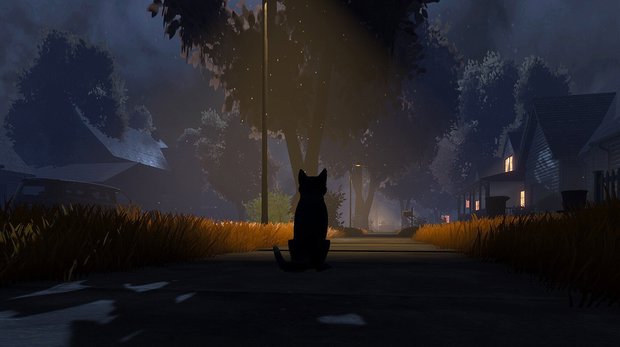
- 1 Comment
Feline simulator is cozy and cute with an earnest underlying story, but collared by its limited gameplay and rigid linearity
How would it feel to be a cat and do whatever you want? Spoonful of Wonder’s Copycat tries to offer that scenario within a heartfelt story between a pet and its human. But just as the behavior of cats can be very unpredictable, so does the game not always perform the way you would like. Don’t expect a “litterbox” experience with lots of possibilities. Instead, it’s a very linear narrative with limited exploration and choices, with only some mini-games sprinkled throughout giving it a little semblance of gameplay.
You start off not on four legs but on two, playing as a sickly, elderly lady named Olive. Her beloved pet cat recently ran away, so she pays a visit to the local animal shelter to pick out a new one. From Olive’s first-person point of view, you slowly – achingly slowly, mimicking her limited abilities – walk towards the cages automatically, only being able to move the camera around a bit, and choose between six felines to take one home with you.
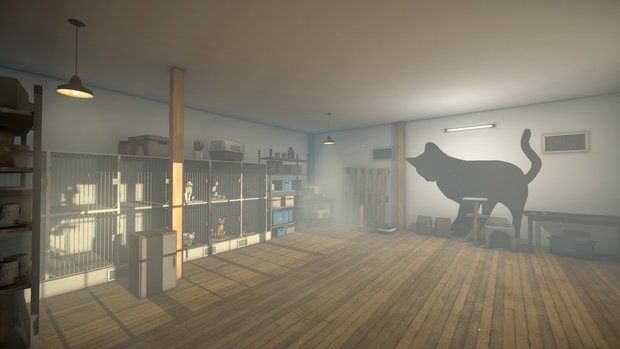
For the rest of the game, you play as Dawn, controlled via gamepad or keyboard and mouse, with some early pop-up tutorial instructions teaching you “how to cat.” The camera will shift between perspectives depending on what’s going on, which I found very confusing at times since it wasn’t always clear when I was supposed to take control. While exploring the house, the backyard and streets, you’ll guide Dawn along from a third-person perspective. If you’re interacting with Olive, however, or sneaking to steal some food lying unattended on the dinner table, among other tasks, you’ll get a first-person viewpoint.
The setting is very realistic with decent 3D graphics and loads of details in the environment. The rooms of the house are filled with furniture and decorations, granting a bit of backstory to Olive: a condolence card on a nightstand, a brochure of a nursing home in the trash, paintings of a younger Olive with her daughter still a kid that Olive painted herself. Olive really moves like an old lady, though I found her voice actor sounded younger than the character’s appearance. To be honest, her facial features resemble my wife’s grandfather so much, only with longer hair, it was almost funny every time she came into view. For her part, Dawn moves like a real cat; the only glitch I noticed is that she sometimes seems to walk or lie just below the surface of the floor, but that’s a minor nitpick.
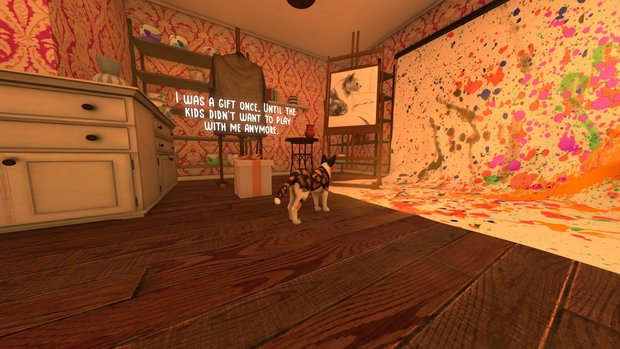
Even when you’re free to move about, exploration and interactions are very limited. You can walk around, but other than meowing all the time there’s not much to do. You can jump on tables and window sills. You can knock stuff over and push it across the floor. During some sequences, like wandering along the top of the backyard fence, you’ll even have to relinquish control of the camera and only get a side view of Dawn, restricted to walking to the right, platformer-style. These sequences do reveal a couple of micro-stories about the neighbors to make them more interesting: an arguing husband and wife; a young couple deeply in love who just moved in together; a lonely man seeking solace in beer. Little details like these add to the game’s general theme of finding your own identity and a place in the world that you can call home.
Overall, Copycat follows a very linear path through its well-defined main story. You can’t really choose how to behave beyond following on-screen prompts telling you exactly what the writers envisioned should happen. For instance, in your first interaction with Olive, you can choose to either bite her or scratch her. There’s no option NOT to attack her. In the same vein, you can’t ignore that steak on the table, and you HAVE to knock over everything standing in your way in order to progress. You can’t leave the paint cans alone and NOT get paw prints all through the house. There’s no option to be a better-behaved cat, and many times I had to do things I really didn’t want to do.
Granted, there’s a reason for this, as you’ll soon learn of Dawn’s troubled background with a previous family. She’s determined not to be kept housebound ever again, and does everything she can to sabotage the relationship. She doesn’t want to be a pet, she wants to be free, on her own, and she basically yearns for Olive to throw her out of the house. What she doesn’t count on is Olive’s persistent affection and ailing health that begin to break down Dawn’s resistance to forming another human-animal bond. It’s an intriguing emotional core, so it’s a shame the gameplay and player agency is so limited. This diminished the level of fun I had with the game, because it didn’t feel like I was actually playing. While it looks like a 3D exploration game, it felt more like a visual novel.
What I did enjoy was seeing Dawn’s (unvoiced) thoughts in big white lettering floating throughout the world above points of interest. Like any self-respecting feline, she has a very sassy mind when she gives her opinion on everything she encounters in life, like Olive’s paintings, or the ugly rug in the bathroom. You can’t actually DO anything with those “hotspots,” but at least it is funny to discover what Dawn thinks of them.
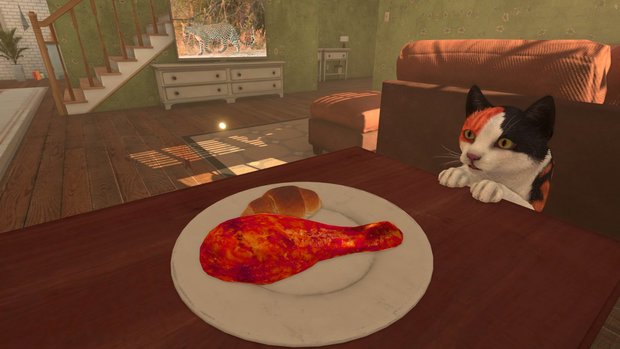
There is some voice work in Copycat, as a narrator begins following Dawn around after she hears him on Olive’s TV. The woman is a big fan of nature documentaries, and on her first day in the house Dawn watches leopards hunting in the savannah. Immediately, her optimal goal is established: she wants to escape the house and become a wildcat too. The documentary’s voice-over then accompanies her wherever she goes.
The documentary’s music also pops up every time Dawn is faced with a challenge. The game’s regular soundtrack features a gentle yet slightly jazzy piano, but confronted with a particular quest, African drums and flute resound while a baritone choir pops up with full Lion King flair. Stretching the illusion even further, several times the entire scenery will change to a huge, open grassland setting as you enter Dawn’s quite surrealistic dreams, where she takes on the shape of a stylistically drawn black panther trying to catch rabbits, surrounded by balloon-shaped trees and bushes.
Halfway through this three-hour game, the mood changes when something unexpected happens and Dawn’s world is thrown upside down. She has to take care of herself from this point on as she finds herself thrust into the “wild” of the unknown city, avoiding angry dogs, scurrying for food, and trying to find her way back home. Being free is exactly what she’d been wishing for all along, but of course it’s only then that Dawn discovers just how much she’s lost.
A few mini-games in the latter half try to keep things fresh. There are a couple of fight sequences with other cats in a quick time event, where you have to input a series of button combinations to be victorious. There are on-rails chase scenes of Dawn running away through an alley with a dog right on her tail, with you pressing right or left to avoid obstacles in her path. And you’ll have to catch a fish taunting you from a city park lake from all sides by pressing the right, middle or left directional buttons at the correct moment, depending on where the fish jumps out. They’re welcome examples of interactivity, though they’re over quickly and don’t pose much of a challenge.
Final Verdict
It’s not just because I’m more of a dog lover that I didn’t enjoy Copycat as much I did, say, Dog’s Life on my old PS2. The game does have a certain charm, and it’s clearly a labor of love for cats, conveyed through a thoughtful, mature story of abandonment and the meaning of family and home. It gets pretty dramatic in places, and you’ll feel fairly angry at some of the humans you encounter, but it’s effective and not overdone. It didn’t immediately make me pull a box of tissues closer, but it certainly has the potential to tug on many an animal lover’s heartstrings. It’s a shame, then, that the cozy but limited gameplay and even more limited choices aren’t really enough for me to enthusiastically recommend that everyone take home a copy for themselves.
Hot take
Copycat’s linear cozy feline simulator is a far too tame to measure up to its own in-game wildlife ambitions, though its playful yet emotional story might purr its way into an animal lover’s heart.
Pros
- Cat thoughts and narrator comments lighten the mood
- Realistic look, sound and feel of being a cat
- Subtle environmental details add to the story
Cons
- Very little challenging gameplay
- Constant switching of perspectives is jarring
- Linear story offers limited choices of how to respond
Johnny played Copycat on PC using a review code provided by the game’s publisher.


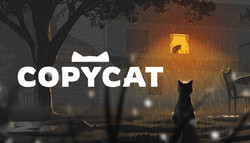
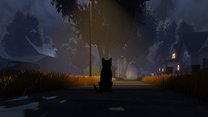







1 Comment
Want to join the discussion? Leave a comment as guest, sign in or register in our forums.
The game was cute and made me a cry and I love my furr babies and I have two cats and it shows u just how much pets do need us just like we need them. Game closed a few times during play and I wish the game was a bit longer and different ending. But still cute over all.
Reply
Leave a comment